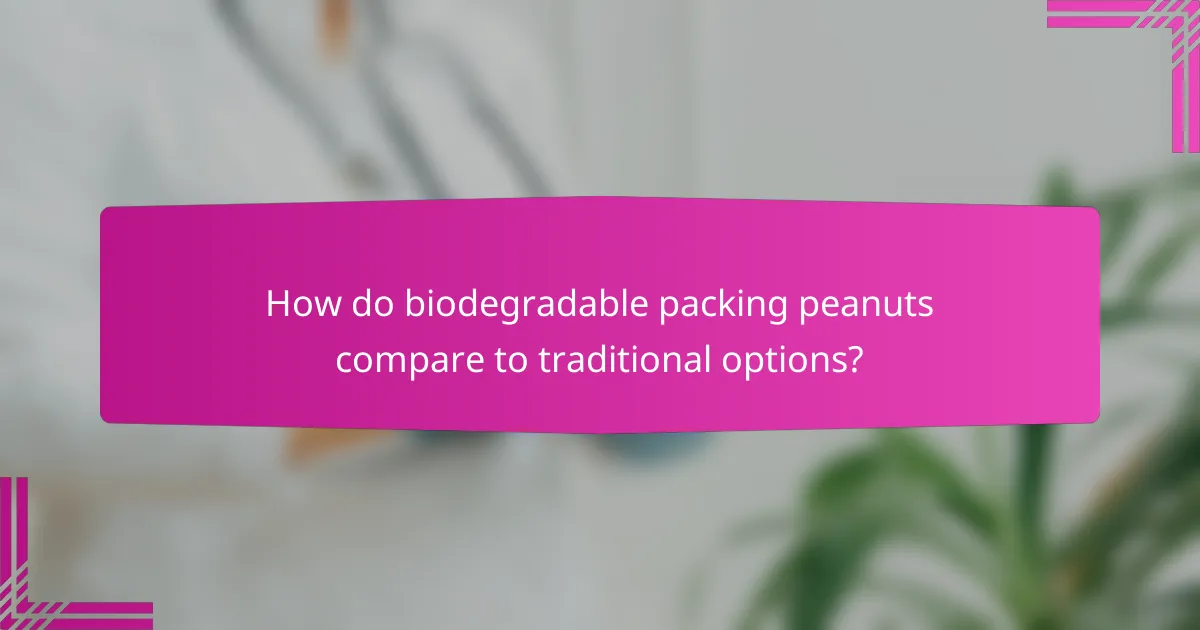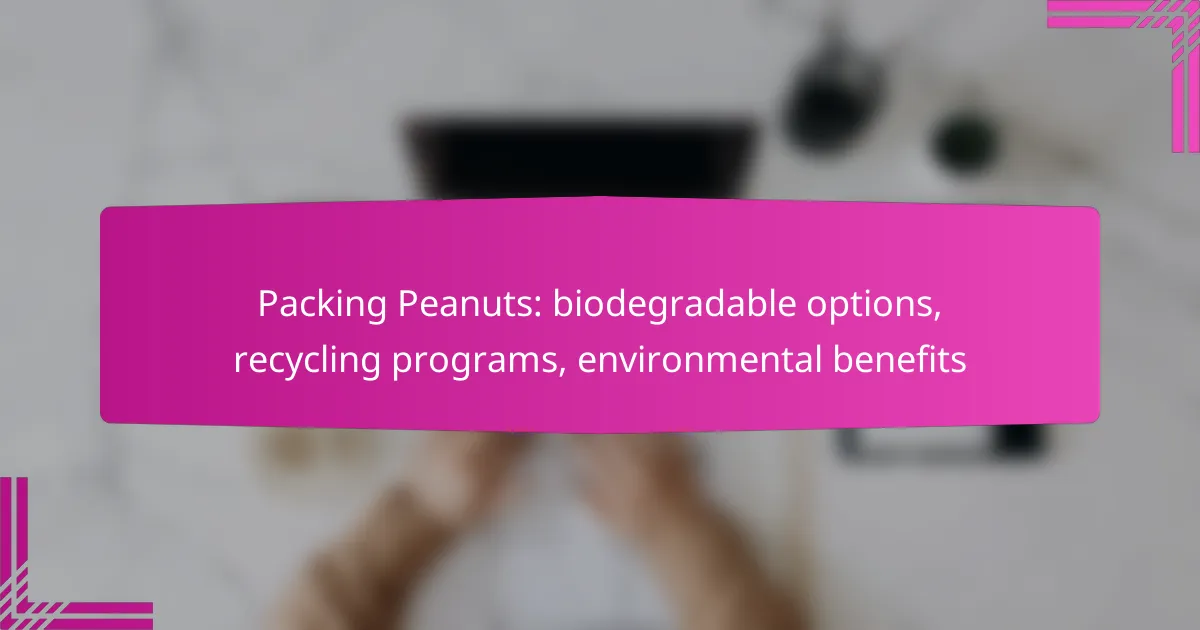Biodegradable packing peanuts, made from starch, plant materials, or recycled paper, provide an eco-friendly alternative to traditional polystyrene options. In New Zealand, various recycling programs ensure these materials are reused or disposed of responsibly, further minimizing environmental impact. By choosing biodegradable peanuts, consumers can significantly reduce waste and support sustainable practices that benefit the planet.

What biodegradable packing peanuts are available in New Zealand?
In New Zealand, several biodegradable packing peanuts are available, primarily made from starch, plant materials, or recycled paper. These options provide environmentally friendly alternatives to traditional polystyrene peanuts, reducing waste and supporting sustainability.
Starch-based packing peanuts
Starch-based packing peanuts are made from natural starch sources, such as corn or potatoes. They dissolve in water, making them easy to dispose of without harming the environment. When using starch-based peanuts, ensure they are stored in a cool, dry place to maintain their integrity.
These packing peanuts are lightweight and provide good cushioning for fragile items. They are often compostable, adding to their appeal for eco-conscious consumers.
Plant-based packing peanuts
Plant-based packing peanuts are derived from renewable resources like wheat or rice. They are designed to break down naturally, either in compost or through microbial action. These peanuts can be a great choice for businesses looking to enhance their green credentials.
When selecting plant-based packing peanuts, check for certifications that indicate they meet compostability standards, ensuring they will decompose effectively without leaving harmful residues.
Recycled paper packing peanuts
Recycled paper packing peanuts are made from shredded paper and are a sustainable option for packing materials. They are biodegradable and can be recycled again after use, making them a circular choice for packaging. These peanuts are typically heavier than starch or plant-based options, offering solid protection for items during shipping.
When using recycled paper peanuts, consider their moisture sensitivity, as they can lose effectiveness when wet. They are best suited for dry environments and can be a cost-effective solution for businesses aiming to reduce their environmental impact.

How can I recycle packing peanuts in New Zealand?
In New Zealand, recycling packing peanuts is possible through various local programs and initiatives. Many communities offer options to ensure these materials are reused or properly disposed of, reducing environmental impact.
Local recycling programs
Several local councils in New Zealand have established recycling programs that accept packing peanuts. Check with your local council’s waste management department to find out if they have specific drop-off points or collection services for these materials.
Some regions may partner with businesses that specialize in recycling packaging materials, providing additional avenues for disposal. Always verify what types of packing materials are accepted, as policies can vary.
Mail-back recycling options
Mail-back recycling programs allow individuals to send their packing peanuts to designated facilities. Companies like the Peanut Hotline offer services where you can ship your packing peanuts for recycling, ensuring they are processed responsibly.
Before using a mail-back service, confirm the costs involved, as shipping fees can vary. It’s often best to collect a larger quantity to make the most of the service economically.
Retail drop-off locations
Many retail stores in New Zealand, especially those that sell packaging materials, provide drop-off locations for packing peanuts. Stores like The Warehouse or local packaging suppliers may accept these items for reuse.
When visiting a drop-off location, check for signage indicating accepted materials. It’s a good practice to call ahead to ensure they are currently accepting packing peanuts, as policies can change based on demand and storage capacity.

What are the environmental benefits of biodegradable packing peanuts?
Biodegradable packing peanuts offer significant environmental benefits by reducing waste and promoting sustainable practices. These eco-friendly alternatives break down naturally, minimizing their impact on landfills and the planet.
Reduced landfill waste
Biodegradable packing peanuts decompose over time, significantly reducing the volume of waste sent to landfills. Traditional polystyrene peanuts can take hundreds of years to break down, whereas biodegradable options typically break down within months under the right conditions.
Using biodegradable peanuts can lead to a decrease in landfill contributions, which is crucial as many regions face space limitations. Consumers can also check local waste management guidelines to ensure proper disposal and composting options are available.
Lower carbon footprint
The production of biodegradable packing peanuts generally involves fewer fossil fuels compared to conventional materials. This leads to a lower carbon footprint during manufacturing, which is essential in combating climate change.
Additionally, when biodegradable peanuts decompose, they can contribute to soil health, further offsetting carbon emissions. Choosing products made from renewable resources, like cornstarch or recycled paper, can enhance these benefits.
Support for sustainable practices
Opting for biodegradable packing peanuts supports a broader shift towards sustainable business practices. Companies that use eco-friendly materials often attract environmentally conscious consumers, enhancing their brand reputation.
Moreover, many manufacturers of biodegradable peanuts engage in responsible sourcing and production methods, which can include using renewable energy. Supporting these businesses not only promotes sustainability but also encourages innovation in eco-friendly packaging solutions.

What criteria should I consider when choosing packing peanuts?
When selecting packing peanuts, consider their material composition, cost-effectiveness, and availability in your region. These factors will help you make an informed choice that balances environmental impact with practical needs.
Material composition
The material composition of packing peanuts significantly affects their environmental footprint. Traditional packing peanuts are made from polystyrene, which is not biodegradable and can contribute to plastic pollution. In contrast, biodegradable options are often made from materials like cornstarch or recycled paper, which break down more easily in the environment.
When evaluating packing peanuts, check for certifications or labels indicating biodegradability. Some products may also be compostable, which adds to their eco-friendliness. Always consider how the material will perform in protecting your items during shipping.
Cost-effectiveness
Cost-effectiveness is a crucial factor when choosing packing peanuts. Biodegradable options may have a higher upfront cost compared to traditional polystyrene peanuts, but they can save money in the long run by reducing disposal fees and potential environmental fines.
Compare prices from different suppliers to find the best deal. Keep in mind that while biodegradable peanuts might seem pricier, their environmental benefits can outweigh the costs, especially for businesses aiming to enhance their sustainability practices.
Availability in New Zealand
In New Zealand, the availability of packing peanuts can vary based on local suppliers and demand for eco-friendly products. Biodegradable packing peanuts are becoming more popular, but they may not be as widely stocked as traditional options.
Check with local packaging suppliers or online retailers to find biodegradable packing peanuts. Some companies may offer bulk purchasing options, which can be more cost-effective and ensure you have a steady supply. Additionally, consider reaching out to businesses that specialize in sustainable packaging for more tailored solutions.

How do biodegradable packing peanuts compare to traditional options?
Biodegradable packing peanuts offer an eco-friendly alternative to traditional polystyrene options, breaking down naturally over time. While they serve the same purpose in protecting items during shipping, their environmental benefits and decomposition rates set them apart.
Decomposition rates
Biodegradable packing peanuts typically decompose within a few months to a couple of years, depending on environmental conditions. In contrast, traditional packing peanuts can take hundreds of years to break down, contributing significantly to landfill waste.
Factors influencing decomposition include moisture, temperature, and microbial activity. For instance, in a composting environment, biodegradable peanuts may break down much faster than in a dry landfill.
Environmental impact
The environmental impact of biodegradable packing peanuts is considerably lower than that of traditional options. They are often made from natural materials like cornstarch or wheat, which reduces reliance on petroleum-based products.
Using biodegradable peanuts can help reduce plastic pollution and greenhouse gas emissions. Many municipalities encourage their use as part of broader sustainability initiatives, aligning with regulations aimed at reducing single-use plastics.
Performance in shipping
In terms of performance, biodegradable packing peanuts provide similar cushioning and protection as traditional options. They are lightweight, which helps keep shipping costs low, and they can fill voids effectively to prevent damage during transit.
However, some users report that biodegradable peanuts may not be as durable in high-humidity conditions, potentially compromising their protective qualities. It’s essential to assess the shipping environment and choose the appropriate packing material accordingly.

What are the future trends in sustainable packing materials?
Future trends in sustainable packing materials are increasingly focused on biodegradable options, recycling programs, and environmental benefits. As consumers and businesses prioritize eco-friendly practices, innovations in materials and processes are emerging to reduce waste and enhance sustainability.
Biodegradable options for packing peanuts
Biodegradable packing peanuts are made from natural materials such as cornstarch or wheat, which break down more easily than traditional polystyrene options. These materials can decompose in composting environments, making them a more environmentally friendly choice for shipping and packaging.
When selecting biodegradable packing peanuts, consider their performance in protecting items during transit. They should provide adequate cushioning while also being lightweight to minimize shipping costs. Look for products that meet recognized compostability standards, such as ASTM D6400 in the U.S. or EN 13432 in Europe.
Recycling programs for packing peanuts
Many communities and businesses are implementing recycling programs specifically for packing peanuts, allowing consumers to return used materials for reuse. These programs help divert waste from landfills and promote a circular economy by ensuring packing peanuts can be repurposed rather than discarded.
To participate in recycling programs, check with local shipping stores or packaging suppliers that accept packing peanuts. Some companies may offer incentives for returning these materials, making it a practical choice for environmentally conscious consumers.
Environmental benefits of sustainable packing materials
Using sustainable packing materials, including biodegradable options and recyclable packing peanuts, significantly reduces environmental impact. These materials help decrease landfill waste, lower carbon footprints, and conserve resources by minimizing reliance on non-renewable materials.
Incorporating sustainable packing solutions can also enhance a brand’s reputation, appealing to eco-conscious consumers. Businesses that prioritize sustainability often see increased customer loyalty and can differentiate themselves in a competitive market.
